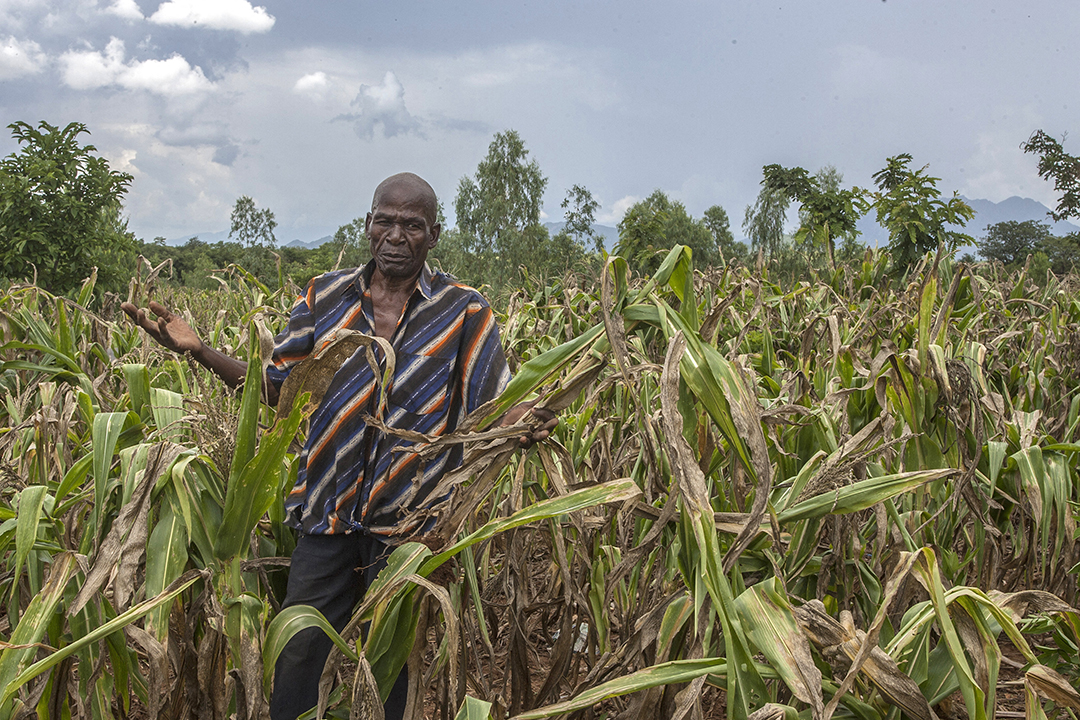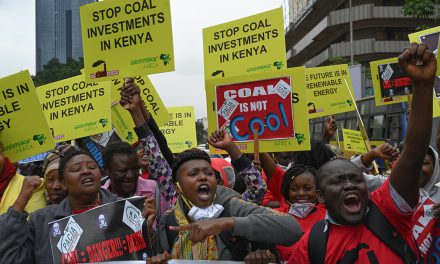Earlier this year, the board of the African Development Fund approved a $22.7 million budget grant for Malawi to help the country reform its agricultural sector and strengthen resilience to climate change.
Agriculture is a crucial part of Malawi’s economy, contributing about 42% to the country’s GDP and plays a vital role in household food security. Maize is the primary food crop, while tobacco accounts for more than 40% of Malawi’s annual export earnings.

Malawian farmer Joseph Kamanga walks through his maize field destroyed by dry spells at Lunzu in Blantyre, Southern Malawi on February 14, 2018. Photo by Amos Gumulira/AFP
However, climate change poses a significant threat to the sustainability of agriculture and food production in Malawi. The new funding programme is designed to address these problems and promote long-term agricultural sustainability. While a step in the right direction, greater finance and capacity support is needed to ensure the survival of Malawi’s agricultural sector.
The World Bank’s 2022 Poverty Assessment for Malawi highlights the agricultural sector’s critical role in the country’s economy. Roughly 85% of Malawi’s population is highly dependent on agricultural jobs for their livelihoods, with 60% of women and 55% of the country’s total labour force participating in the sector.
The assessment suggests substantial rethinking and investment to transform the sector into a catalyst for growth, rural transformation and job creation is required.
Malawi’s agricultural systems are increasingly vulnerable to weather-related risks such as changing rainfall patterns, rising temperatures and frequent occurrences of intense droughts, dry spells, heatwaves, floods, pests and diseases. These risks are expected to escalate, with smallholder farmers being among the most affected.
Given the sector’s size in the economy and the importance of agricultural products for export, agricultural growth is closely correlated with GDP growth. Consequently, drops in agricultural growth adversely affect the entire economy.
For example, Malawi loses a minimum of 2.3 million metric tonnes of maize production annually, estimated at 3.2 billion kwacha, as a result of soil degradation, reducing Malawi’s GDP by 2.7% a year.
Climate-related extreme weather events have also had a major impact on production. In 2022, two cyclones devastated Malawi, resulting in the loss of more than 71,000 hectares of cropped land and 30,000 livestock. According to a report by the Department of Disaster Management Affairs, at least 47,261 farming families were affected in Mulanje, Phalombe, and Mangochi.
These events have also led to bouts of acute food insecurity. During a major drought in 2005, 40% of the population required immediate food aid because of poor harvests.
Adverse weather events can exacerbate pests and disease, and the extent of damage depends on agricultural practices and mitigation activities.
The Malawi government and international development partners have made significant investments in risk-mitigation activities, such as irrigation, conservation agriculture, research and extension services.
Climate financing can further enhance these efforts by providing the necessary financial resources to implement strategies and technologies that boost the resilience and sustainability of agricultural practices.
Malawi’s heavy reliance on rain-fed agriculture makes it highly vulnerable to weather shocks. Despite irrigation being a priority in the national agricultural policy, it remains underused.
As of 2017-18, only 116 249 hectares (29% of the estimated potential of 407,862 hectares) have been developed for irrigation.
It is imperative to prioritise the development of irrigation schemes with a clear timeframe and budget allocation to boost productivity.
Moreover, developing and reinforcing flood defences to protect agricultural lands in regions such as Mulanje, Phalombe and Mangochi from extreme weather events and constructing robust storage facilities to preserve crop yields is crucial.
Climate finance can be a game-changer in catalysing the large-scale adoption of mitigation practices by smallholder farmers.
But the government and donors allocate substantial funds to emergency aid and coping mechanisms in response to climate shocks. This reactive approach diverts funds from long-term development investments. By channelling climate finance into proactive measures, such as improved irrigation, flood defences and climate-resilient infrastructure, Malawi can significantly enhance its agricultural sector’s resilience.
Least-developed countries such as Malawi bear disproportionately high costs relative to their economies for planning and executing adaptation strategies despite often being the most vulnerable to the effects of climate change.
Climate funding is unevenly distributed globally. Africa received a mere 26% of available financing from 2016 to 2019. Furthermore, the majority of this support comes in the form of loans and non-grant instruments that require repayment, placing additional financial strain on already resource-constrained countries.
Alarmingly, only 21% of global climate funding in 2018 was allocated to adaptation efforts, with the majority directed towards emission reduction (mitigation) projects.
Despite being ranked as the fifth-most affected country by the Global Climate Risk Index 2021, Malawi received markedly limited climate financing, placing 75th globally. This disparity underscores a systemic issue where funding tends to gravitate towards regions with established donor presence and countries boasting robust institutional capacities for project implementation.
Investors prioritise stable environments conducive to generating returns, and are often hesitant to invest in nations plagued by weak institutions, market volatility and corruption.
The National Planning Commission’s Malawi Vision 2063 represents a long-term development blueprint to foster a productive and commercialised agricultural sector. Central to this plan is priority areas such as agriculture diversification, irrigation development, anchor farms, agriculture inputs, mechanisation, structured markets and innovation in agriculture research and dissemination.
Underpinning these efforts is the ongoing review of the National Agriculture Policy (2016-2021), aimed at providing clear and comprehensive policy guidance to drive transformative changes in the agricultural sector.
The National Agriculture Policy’s specific objective is to steer Malawi towards an agriculture sector that is capable of sustainable transformation.
Aligned with the National Agriculture Policy is the National Agricultural Investment Plan (2017-2022), which was launched in 2018 and which serves as a strategic framework for guiding investments in the sector.
The National Agricultural Investment Plan ensures coherence with broader policy frameworks, aiming to achieve significant growth in the agricultural sector, enhance incomes for farm households, bolster food and nutrition security and boost agricultural exports.
Additionally, the National Irrigation Policy (2016-2022), launched in 2016, targets problems plaguing the irrigation sector. These include addressing spatial and temporal water shortages, resolving customary land tenure disputes and improving the operation and maintenance of irrigation infrastructure.
These policy frameworks collectively underscore Malawi’s proactive stance in addressing systemic issues in its agricultural landscape. By bolstering policy coherence, strategic investments and institutional frameworks, Malawi aims to catalyse sustainable agricultural development, ensuring resilience against future challenges and fostering economic prosperity for its citizens.
Locally driven climate adaptation solutions should be the focal point, necessitating substantial enhancements to the agricultural subsidy programme, which presently fails to adequately support impoverished households.
This article first appeared in Mail & Guardian.
Leleti Maluleke is a Researcher for our Human Security and Climate Change programme. She completed her Bachelor of Political Science in Political Studies in 2017, and her Honours in International Relations in 2018 at the University of Pretoria. She started her career at International SOS in the Security Services department as a Political Risk and Security Intern. Socially, her countries of interests include Mozambique, Zimbabwe, Zambia and Malawi.












